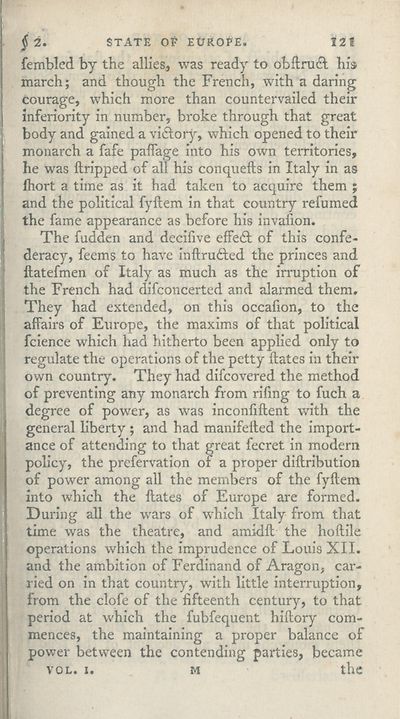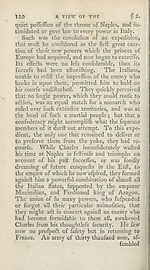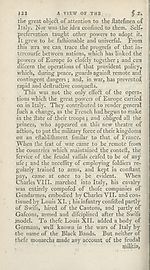Download files
Complete book:
Individual page:
Thumbnail gallery: Grid view | List view

§2. STATE OF EUROPE. 121
fembled by the allies, was ready to obftrucl his
march; and though the French, with a daring
courage, which more than countervailed their
inferiority in number, broke through that great
body and gained a viftory, which opened to their
monarch a fafe paflage into his own territories,
he was ftripped of all his conquefts in Italy in as
Ihort a time as it had taken to acquire them ;
and the political fyftem in that country refumed
the fame appearance as before his invalion.
The fudden and decifive effect of this confe¬
deracy, feems to have inftructed the princes and
ftatefmen of Italy as much as the irruption of
the French had difconcerted and alarmed them.
They had extended, on this occafion, to the
affairs of Europe, the maxims of that political
fcience which had hitherto been applied only to
regulate the operations of the petty ftates in their
own country. They had difeovered the method
of preventing any monarch from rifing to fuch a
degree of power, as was inconfiftent with the
general liberty ; and had manifeffed the import¬
ance of attending to that great fecret in modern
policy, the prefervation of a proper diftribution
of power among all the members of the fyftem
into which the ftates of Europe are formed.
During all the wars of which Italy from that
time was the theatre, and amidft the hoftile
operations which the imprudence of Louis XII.
and the ambition of Ferdinand of Aragon, car¬
ried on in that country, with little interruption,
from the clofe of the fifteenth century, to that
period at which the fubfequent hiftory com¬
mences, the maintaining a proper balance of
power between the contending parties, became
vol. i. m the
fembled by the allies, was ready to obftrucl his
march; and though the French, with a daring
courage, which more than countervailed their
inferiority in number, broke through that great
body and gained a viftory, which opened to their
monarch a fafe paflage into his own territories,
he was ftripped of all his conquefts in Italy in as
Ihort a time as it had taken to acquire them ;
and the political fyftem in that country refumed
the fame appearance as before his invalion.
The fudden and decifive effect of this confe¬
deracy, feems to have inftructed the princes and
ftatefmen of Italy as much as the irruption of
the French had difconcerted and alarmed them.
They had extended, on this occafion, to the
affairs of Europe, the maxims of that political
fcience which had hitherto been applied only to
regulate the operations of the petty ftates in their
own country. They had difeovered the method
of preventing any monarch from rifing to fuch a
degree of power, as was inconfiftent with the
general liberty ; and had manifeffed the import¬
ance of attending to that great fecret in modern
policy, the prefervation of a proper diftribution
of power among all the members of the fyftem
into which the ftates of Europe are formed.
During all the wars of which Italy from that
time was the theatre, and amidft the hoftile
operations which the imprudence of Louis XII.
and the ambition of Ferdinand of Aragon, car¬
ried on in that country, with little interruption,
from the clofe of the fifteenth century, to that
period at which the fubfequent hiftory com¬
mences, the maintaining a proper balance of
power between the contending parties, became
vol. i. m the
Set display mode to:
![]() Universal Viewer |
Universal Viewer | ![]() Mirador |
Large image | Transcription
Mirador |
Large image | Transcription
| Antiquarian books of Scotland > Kings & rulers > History of the reign of the Emperor Charles V. > Volume 1 > (139) |
|---|
| Permanent URL | https://digital.nls.uk/109183999 |
|---|
| Description | By William Robertson. London : Cadell and Davies, 1798. |
|---|---|
| Shelfmark | ABS.1.76.13 |
| Additional NLS resources: | |
| Description | Thousands of printed books from the Antiquarian Books of Scotland collection which dates from 1641 to the 1980s. The collection consists of 14,800 books which were published in Scotland or have a Scottish connection, e.g. through the author, printer or owner. Subjects covered include sport, education, diseases, adventure, occupations, Jacobites, politics and religion. Among the 29 languages represented are English, Gaelic, Italian, French, Russian and Swedish. |
|---|

